Complete Solutions to Problems Based On Mixed Concepts of chapter ELECTRIC CHARGE, FIELD & FLUX of Class 12 book with complete answers and questions
| Class 12 | PHYSICS |
| Chapter | ELECTRIC CHARGE, FIELD & FLUX |
| A2Z | Problems Based On Mixed Concepts |
| Number Of Questions | 40 |
| Academic Year | 2023-24 |
A copper atom consists of copper nucleus surrounded by `29` electrons. The atomic weight of copper is `63.5mol e^(-1)`. Let us now take two pieces of copper each weighing `10g`. Let us trandfer one elcetron from one piece to another for every `100` atoms in that piece. What will be the Coulomb force between the two pieces after the trandfer of electrons, if they are `1cm` apart? Avogadro number`= 6xx10^(23) mol e^(-1)`, charge on an electron `=-1.6xx10^(-19)C`.
View SolutionA particle of mass `m` and carrying charge `-q_(1)` is moving around a charge `+q_(2)` along a circular path of radius `r`. Period of revolution of the charge `-q_(1)` about `+q_(2)` is
View SolutionTwo point electric charges of value `q` and `2q` are kept at a distance `d` apart from each other in air. A third charge `Q` is to be kept along the same line in such a way that the net force action on `q` and `2q` is zero. Calculate the position of charge `Q` in terms of `q` and `d`.
View SolutionIt is requird to hold four equal point charges `+q` in equilibrium at the corners of a square. Find the point charge that will do this, if placed at the centre of the square.
View SolutionTwo infinitely long parallel wires having linear charge densities `lambda_(1)` and `lambda_(2)` respectively are placed at a distance of `R` metres. The force per unit length on either wire will be `(k= 1/(4piepsilon_(0)))`
View SolutionThe insulation property of air breaks down at `E=3xx10^(6) "volt"//meter`. The maximum charge that can be given to a sphere of diameter `5m` is approximately (in coulombs)
View SolutionA charged ball `B` hangs from a silk thread `S`, which makes an angle `theta` with a large charged conducting sheet `P`, as shown in the figure. The surface charge density `sigma` of the sheet is proportional to
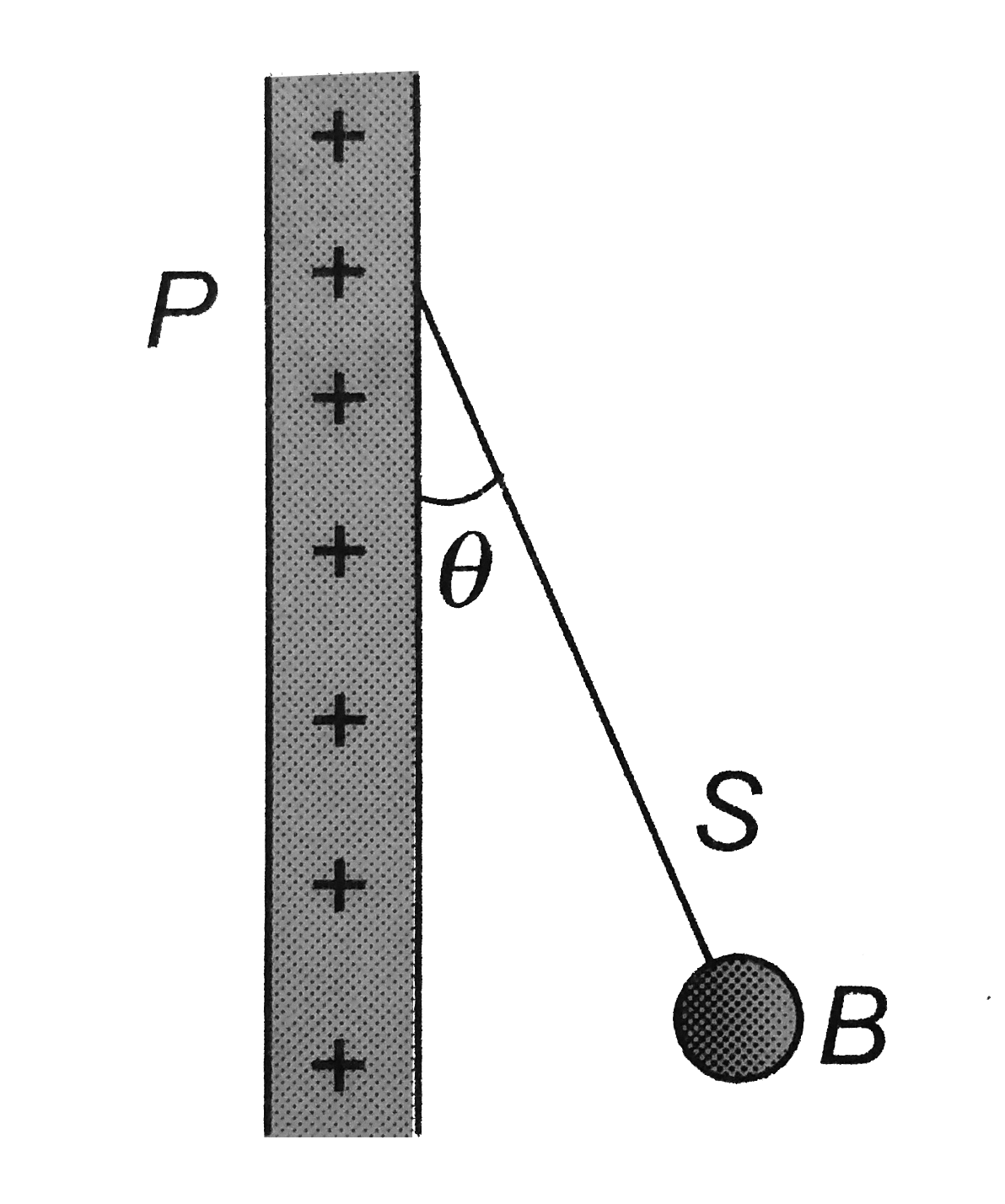
View SolutionA small sphere carrying a charge `q` is hanging in between two parallel plates by a string of length `L`. Time period of pendulum is `T_(0)`. When parallel plates are charged, the time period changes to `T`. The ratio `T//T_(0)` is equal to
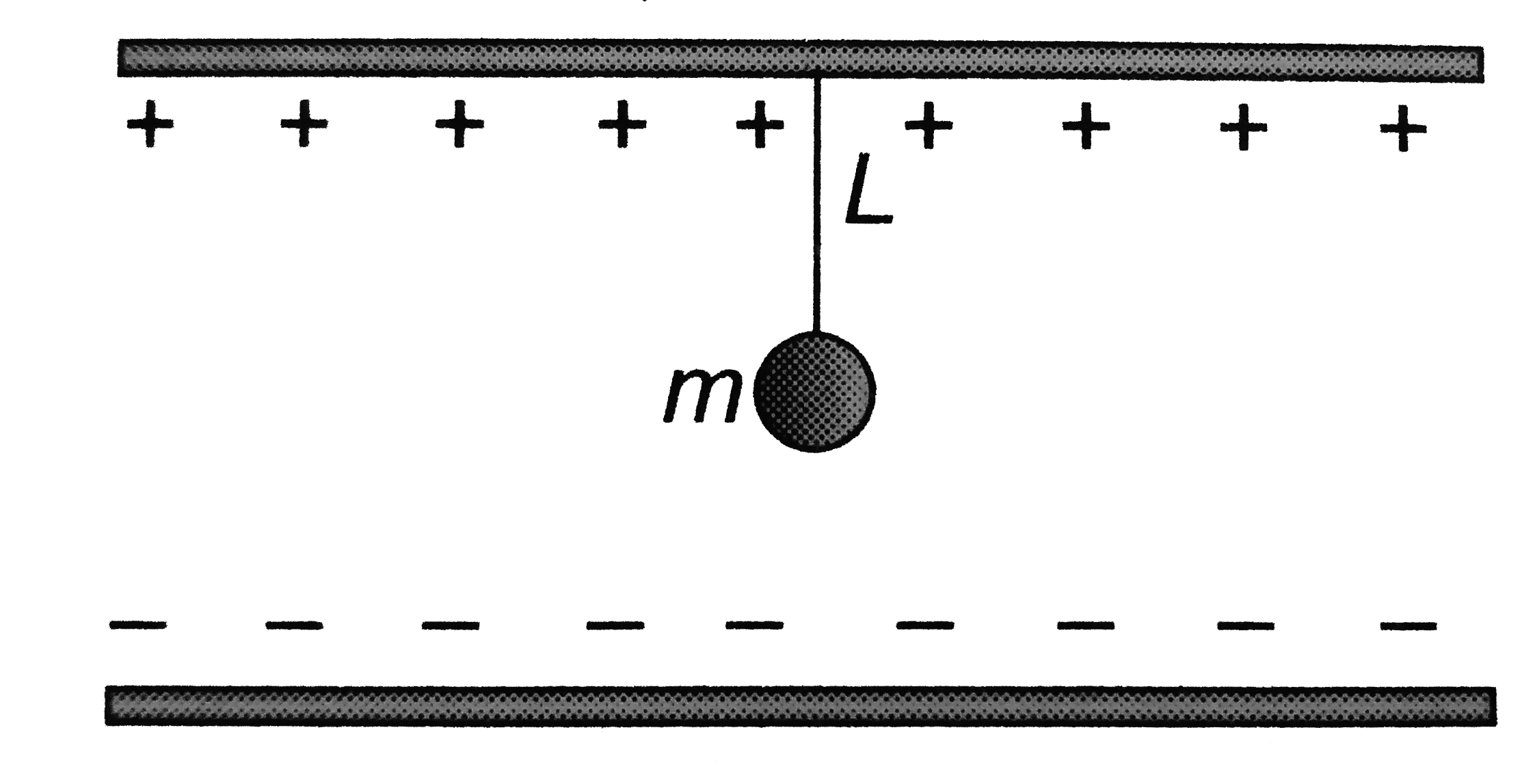
View SolutionTwo charges particle `(M,+Q)` and `(m,-q)` are placed in a gravity free space where a uniform electric field `E` exist. After the particles are released, they stay at a constant distance from each other. What is the distance? Neglect Gravitational interaction. `k` is electrostatic constant.
View SolutionTwo positive point charges each of magnitude `10 C` are fixed at positions `A` &`B` at a seperation `2d= 6m`. A negatively charged particle of mass `m= 90gm` and charge of magnitude `10xx10^(-6)C` is revolving in a circular path of radius `4m` in the plane perpendicular to the line `AB` and bisecting the line `AB`. Neglect the effect of gravity. Find the angular velocity of the particle
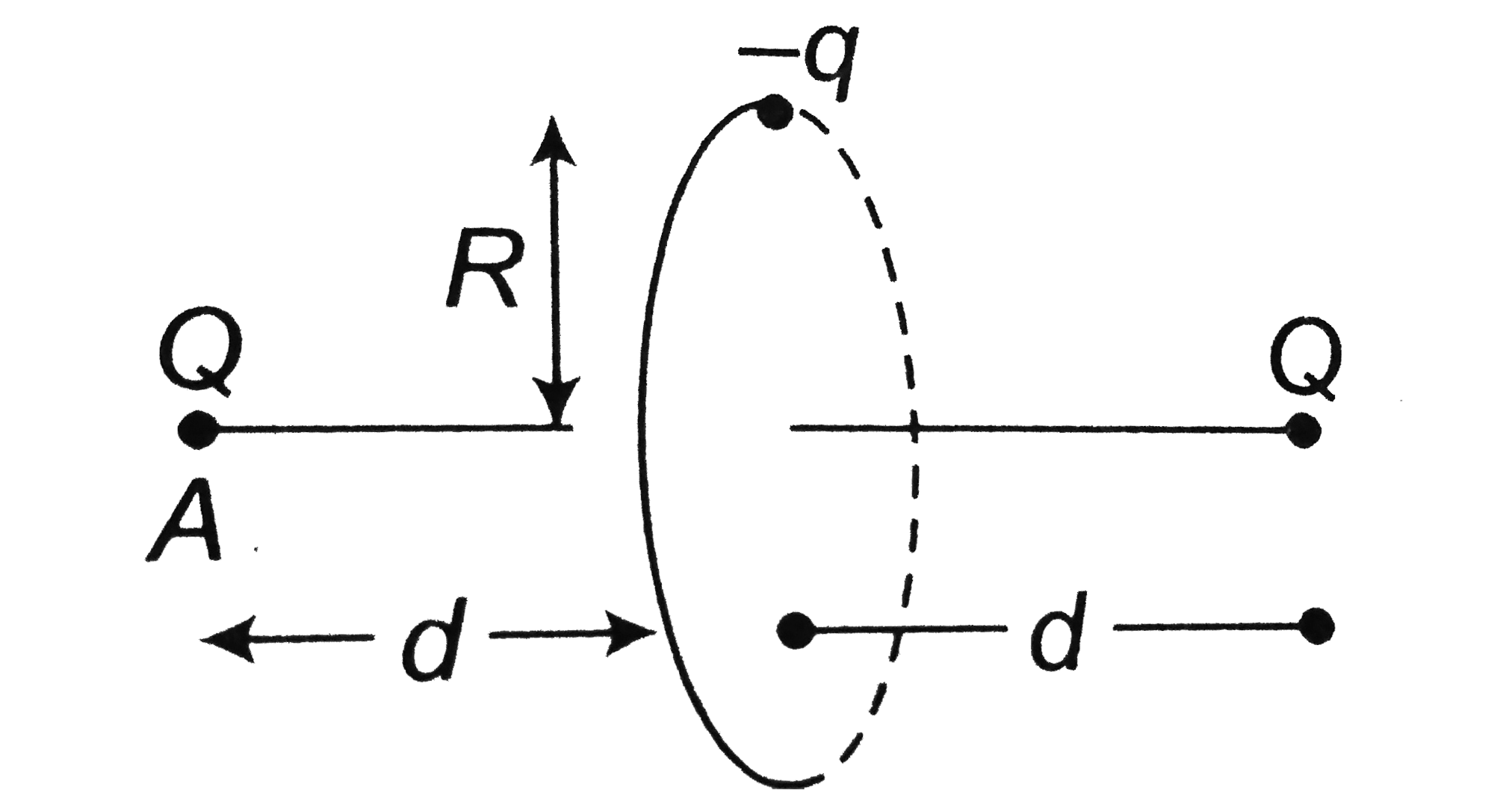
View SolutionThe bob of a pendulum has mass `m= 1kg` and charge `q= 40 muC`. Length of the pendulum is `l=0.9m`. The point of suspension also has the same charge `40 mu C`. What the minimum speed `u` should be imparted to the bob so that it can complete verticel circel ?
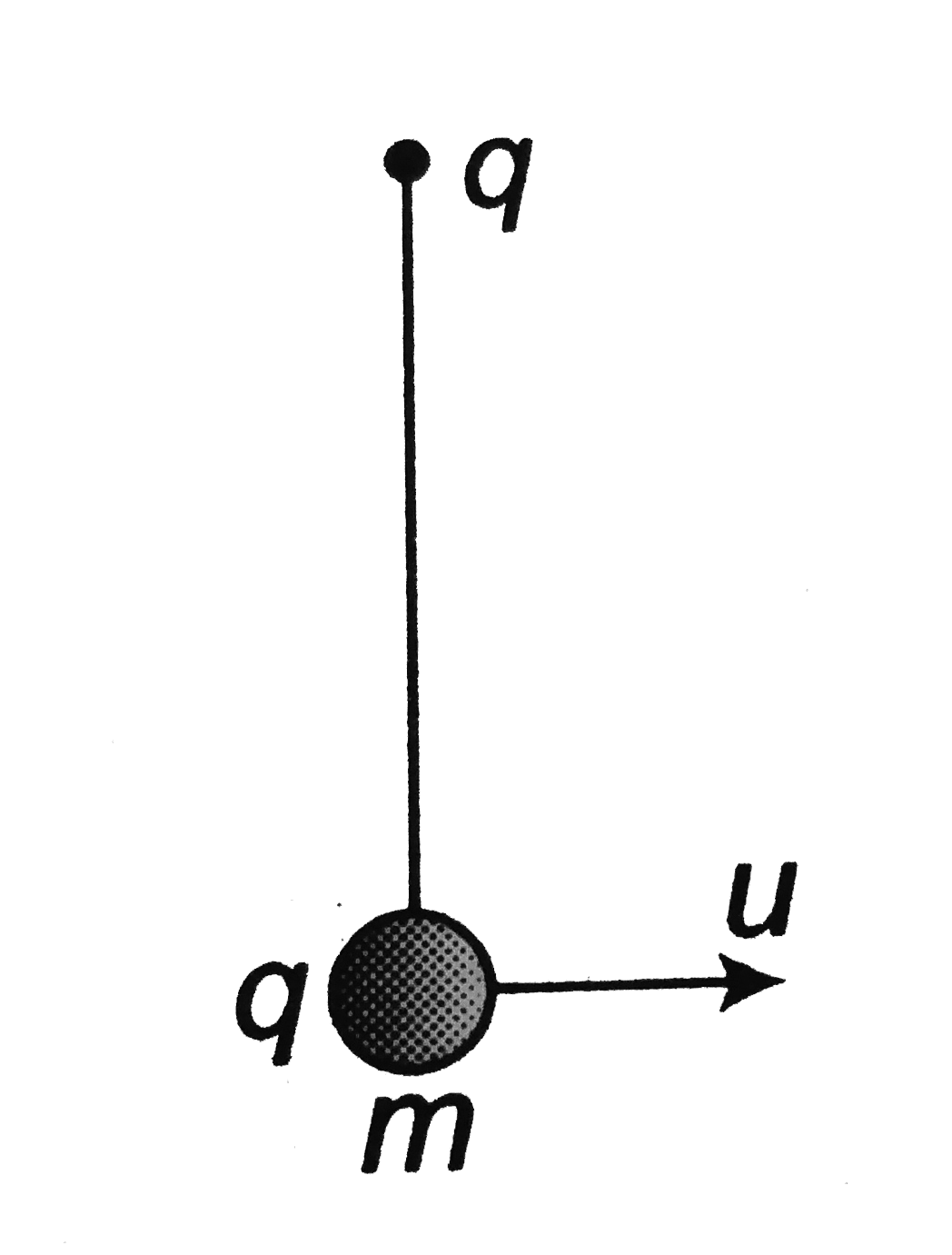
View SolutionA positive charge `q` is placed in front of a conducting solid cube at a distance `d` from its centre. Find the electric field at the centre of the cube due to the charges appearing on its surface.
View SolutionConsider a parallel plate capacitor having an electric field `E` inside it as shown in the adjacent figure. A particle of mass `m` and charge `q` is hanging inside the capacitor through a light inextensible string of length. The time period of this pendulum of small oscillations is
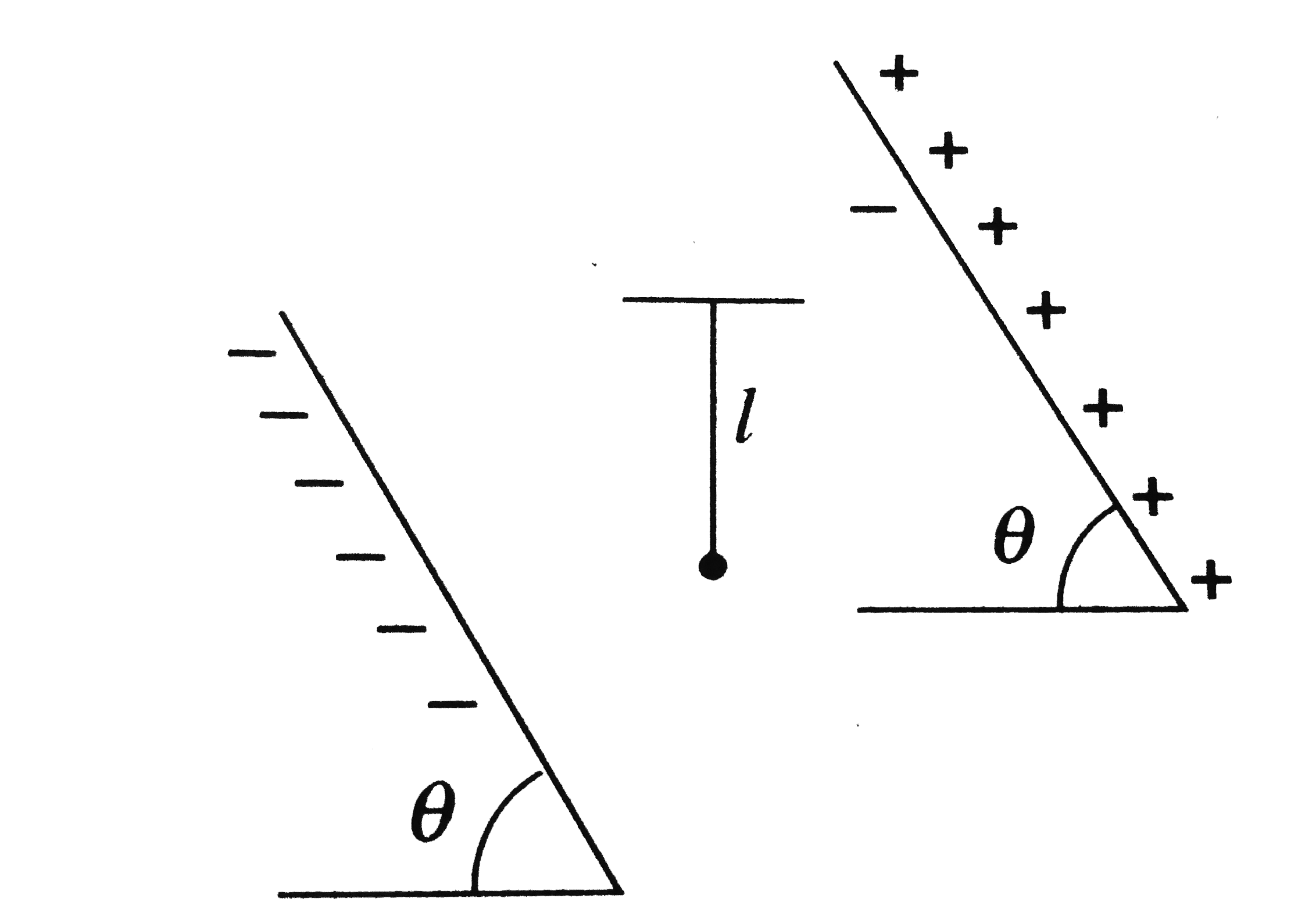
View SolutionA charged particle of mass `m= 2kg` and charge `1 muC` is thrown from a horizontal ground at an angle of `45^(@)` with horizontal with a spedd of `10m//s`. In space a horizontal electric field `E= 2xx10^(7)N//C` exists. Find the range of the projectile
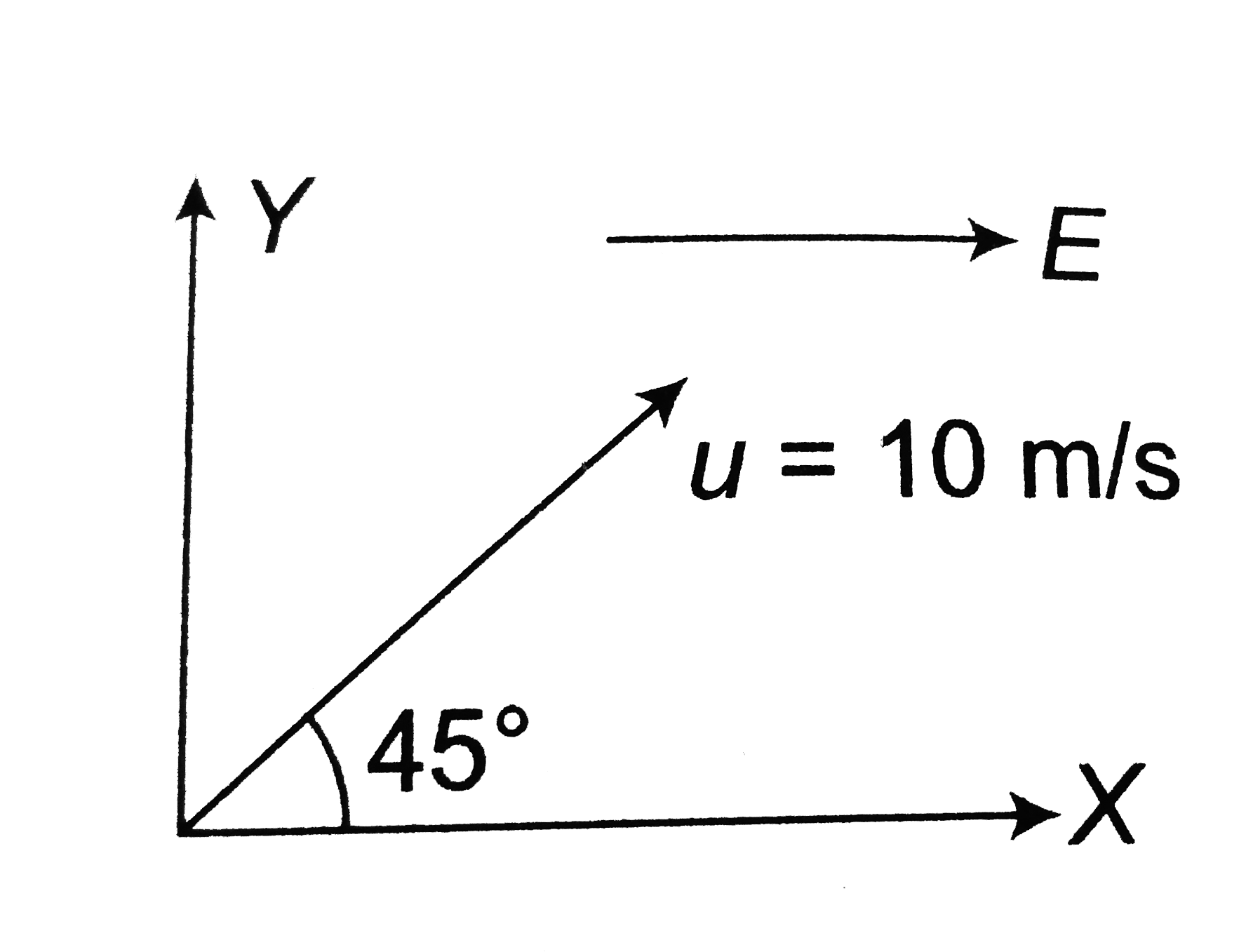
View SolutionFour point positive charges are held at the vertices of a square in a horizontal plane. Their masses are `1kg, 2kg, 3kg, & 4kg`. Another point positive charge of mass `10 kg` is kept on the axis of the sqaure. The weight of their fifth charge is balanced by the electrostatic force due to those four charges. If the four charge on the vertices are released such that they can freely move in any direction(vertical, horizontal etc.) then the acceleration of the centres of mass of the four charges immediately after the release is (Use `g= 10m//s^(2)`)
View SolutionA soap bubble (surface tension`=T`) is charged to maximum surface density of charge`= sigma`. When it is just going to burst. Its radius `R` is given by:
View SolutionIn the diagram shown the charge `+Q` is fixed. Another charge `+2q` and mass M is projected from a distance R from the fixed charge. Minimum separtion between the two charge if the velocity becomes `1/sqrt3` time of the projected velocity, at this moment is (Assume gravity to be absent)
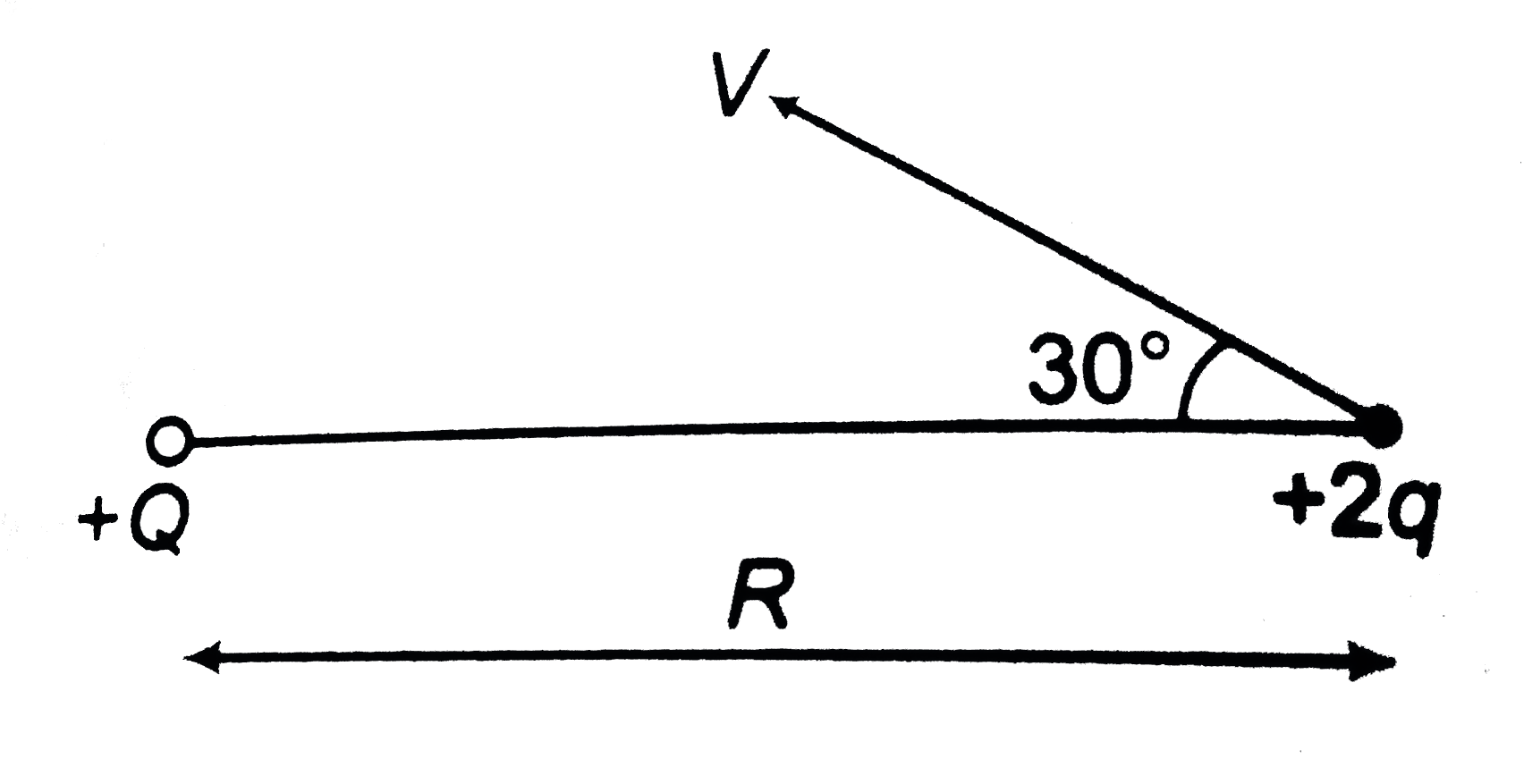
View SolutionTwo concentric conducting shells of radius `a` and `b` `(b gt a)` carry charges `Q` and `-2Q` respectively. The correct variation of electric intensity `E` as a function of `r` is given by
View SolutionElectric field , due to an infinite line of change, as shown in figure at a point `P` at a distance `r` from the line is `E`. If wire is folded at point `A`, so that both parts lie alongside as shown in figure(b), then express electric field at `P` in vector form.
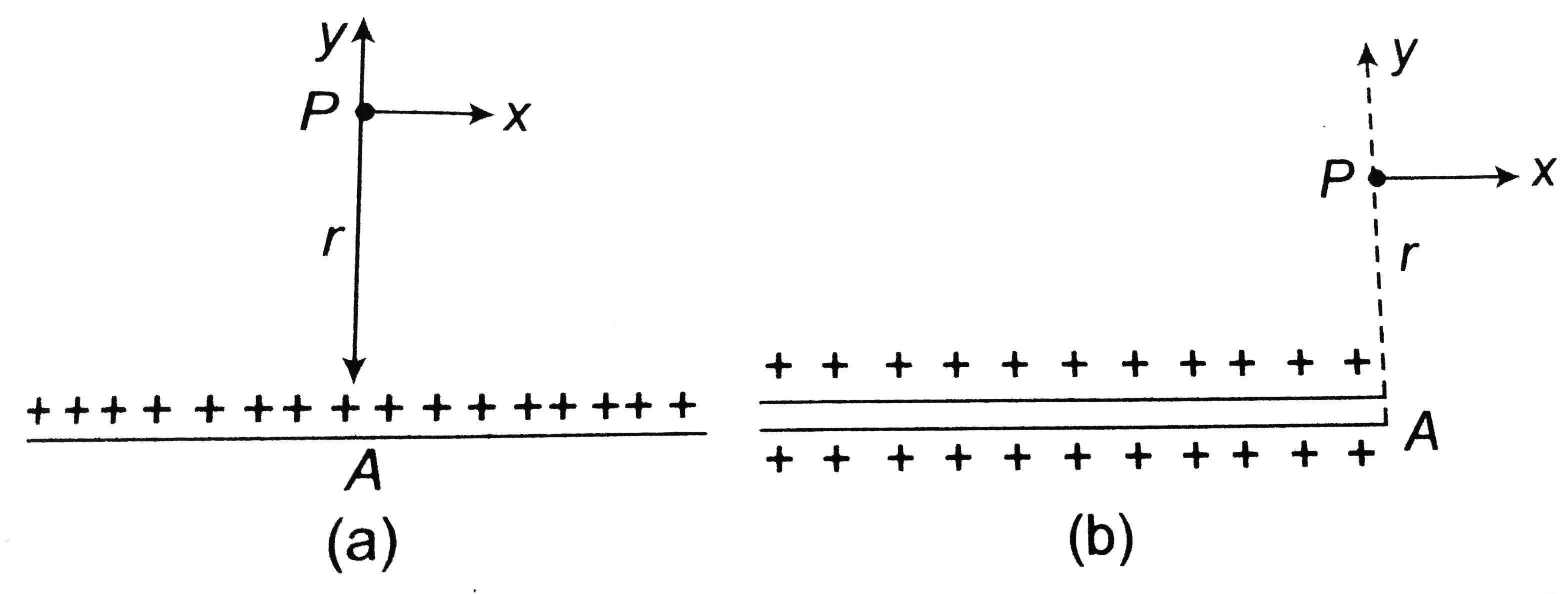
View SolutionA particle of charge `-q` and mass m moves in a circle of radius r around an infinitely long line charge of linear charge density `+lamda`. Then, time period will be
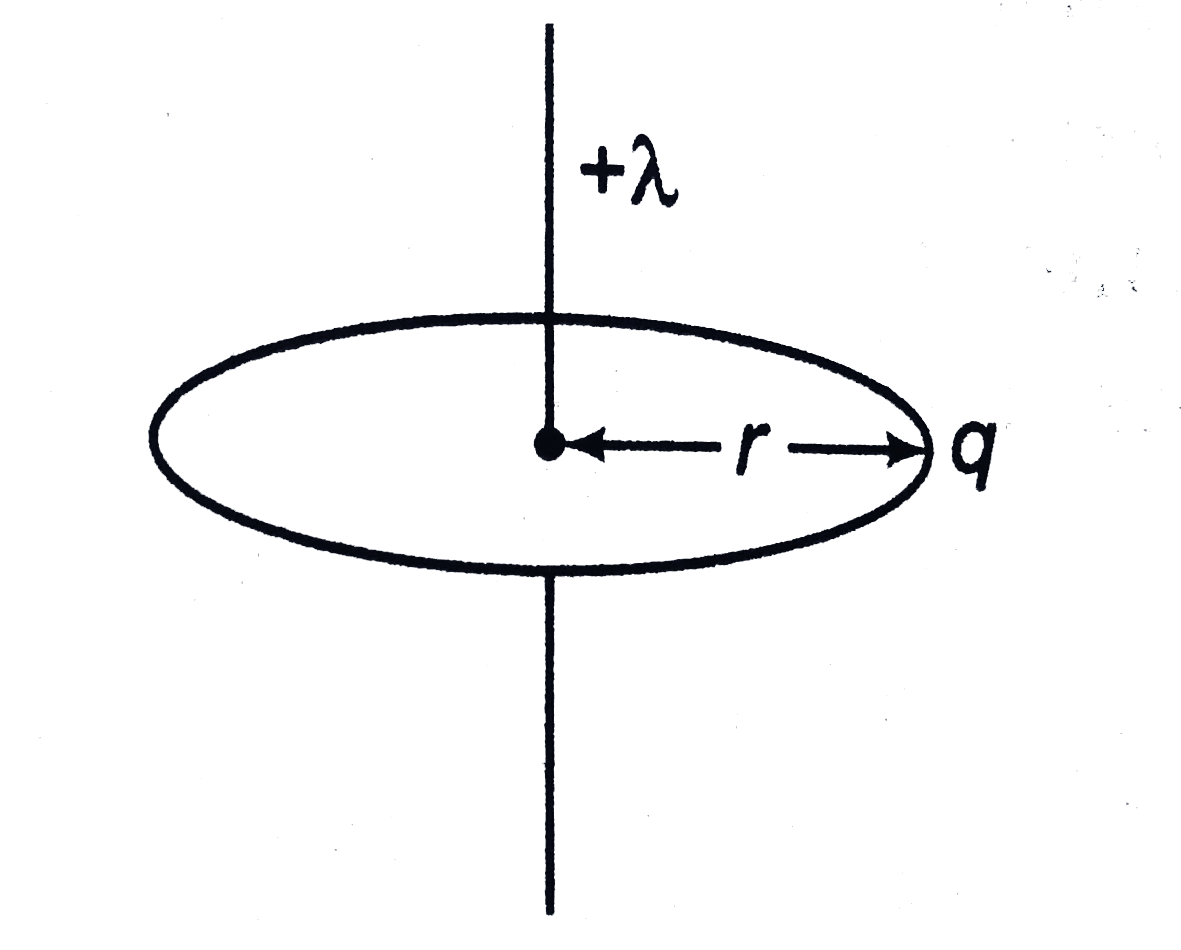 where , `k=1/4piepsilon_0)`
where , `k=1/4piepsilon_0)`
View SolutionTwo similar balloons filled with helium gas are tied to `L m` long string. A body of mass `m` is tied to another ends of the strings. The balloons float on air at distance `r`. If the amount of charge on the ballons is same then the magnitude of charge on each balloon will be
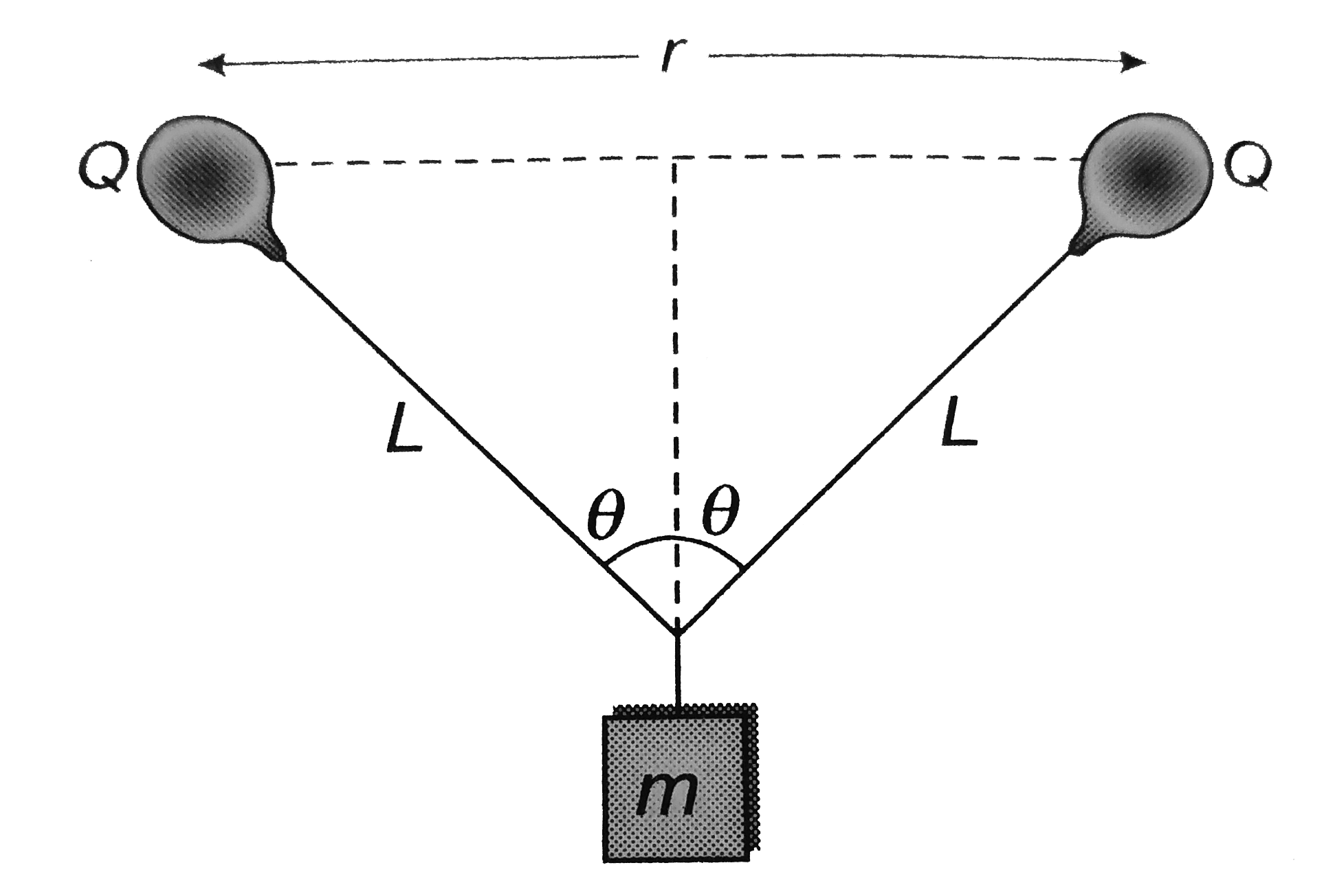
View SolutionTwo identical beads each have a mass m and charge q. When placed in a hemispherical bowl of radius R with frictionless, non-conducting walls, the beads move, and at equilibrium they area distance R apart (figure). Determine the charge on each bead.
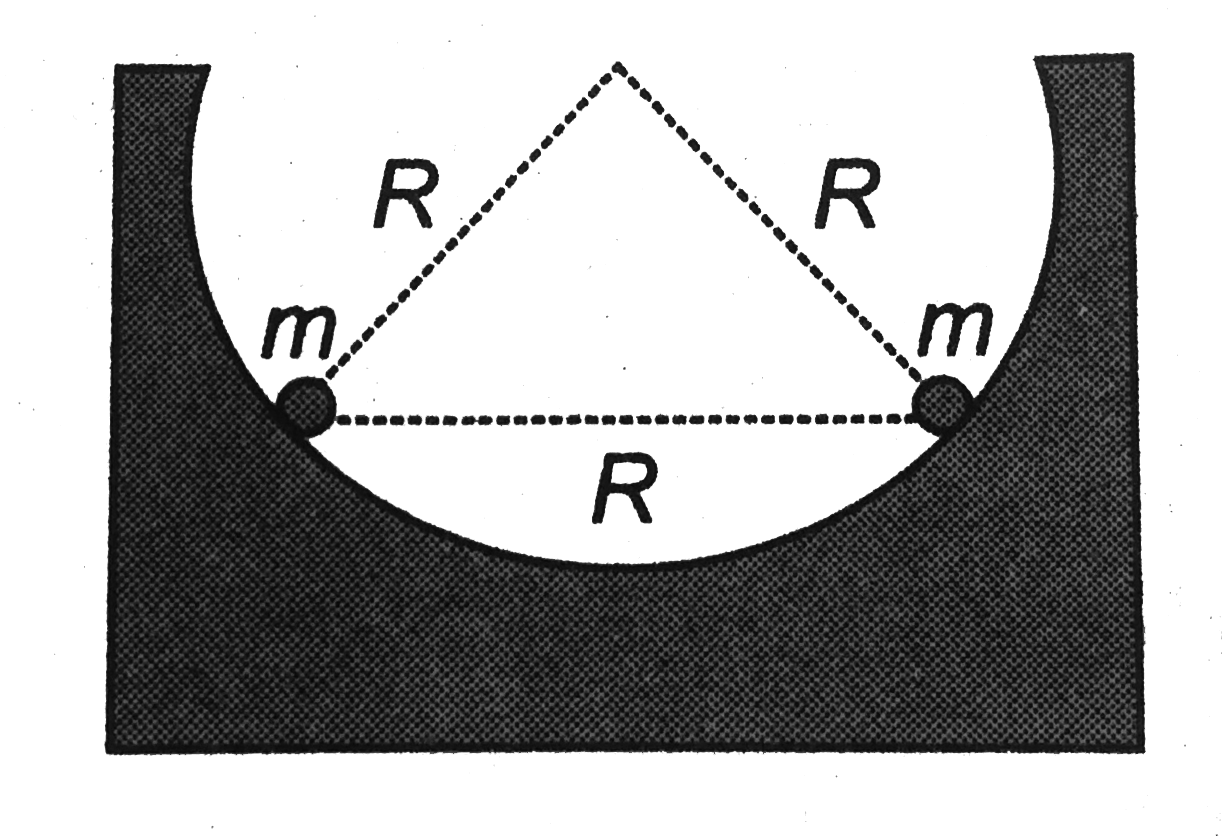
View SolutionIn the figure shown there is a large sheet of charge of uniform surface charge density`'sigma'`.A charge particle of charge `'-q'` and mass `'m'` is projected from a point A on the sheet with a speed `'u'` with the angle of projection such that it lands at maximum distance from A on the sheet. Neglecting gravity, find the time flight
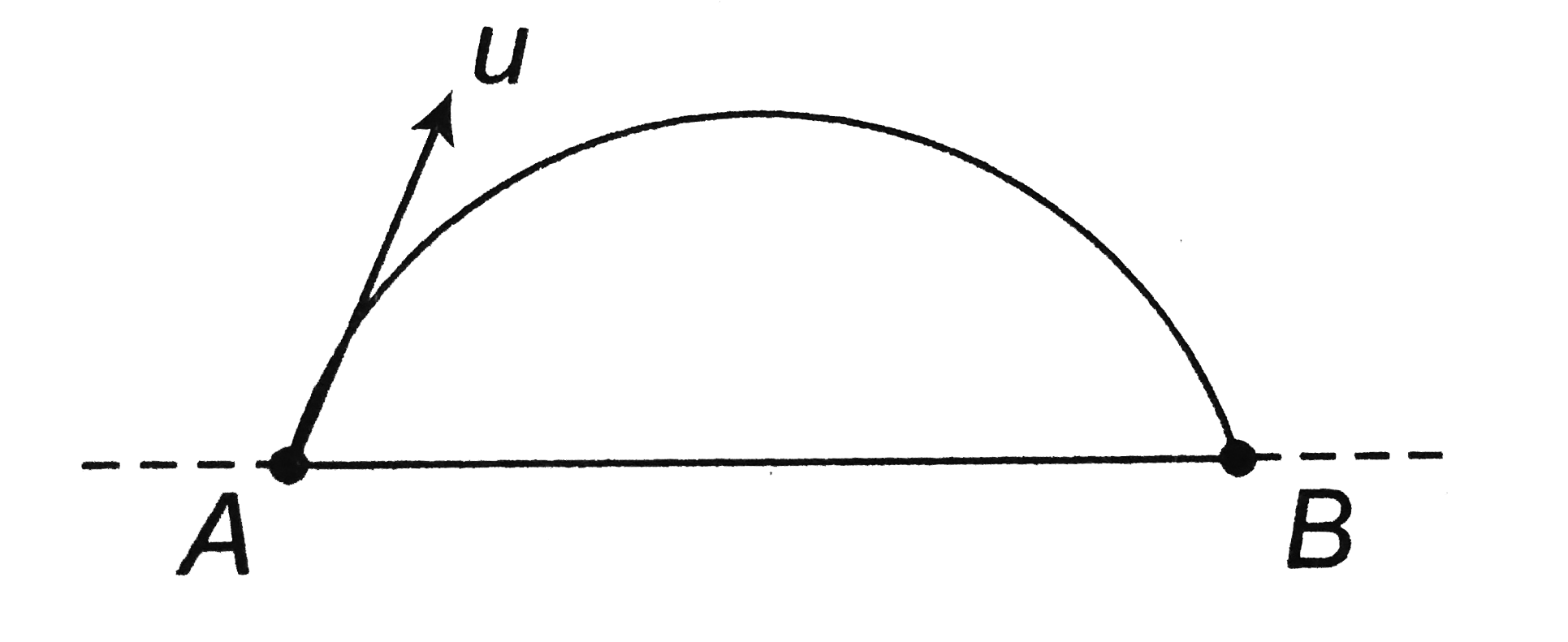
View SolutionAn infinitely long wire is kept along `z`-axis from `z= -oo` to `z=+oo`, having uniform linear cahrges density `(10)/(9) nC//m`. The electric field at point `(6 cm,8cm,10 cm)` will be
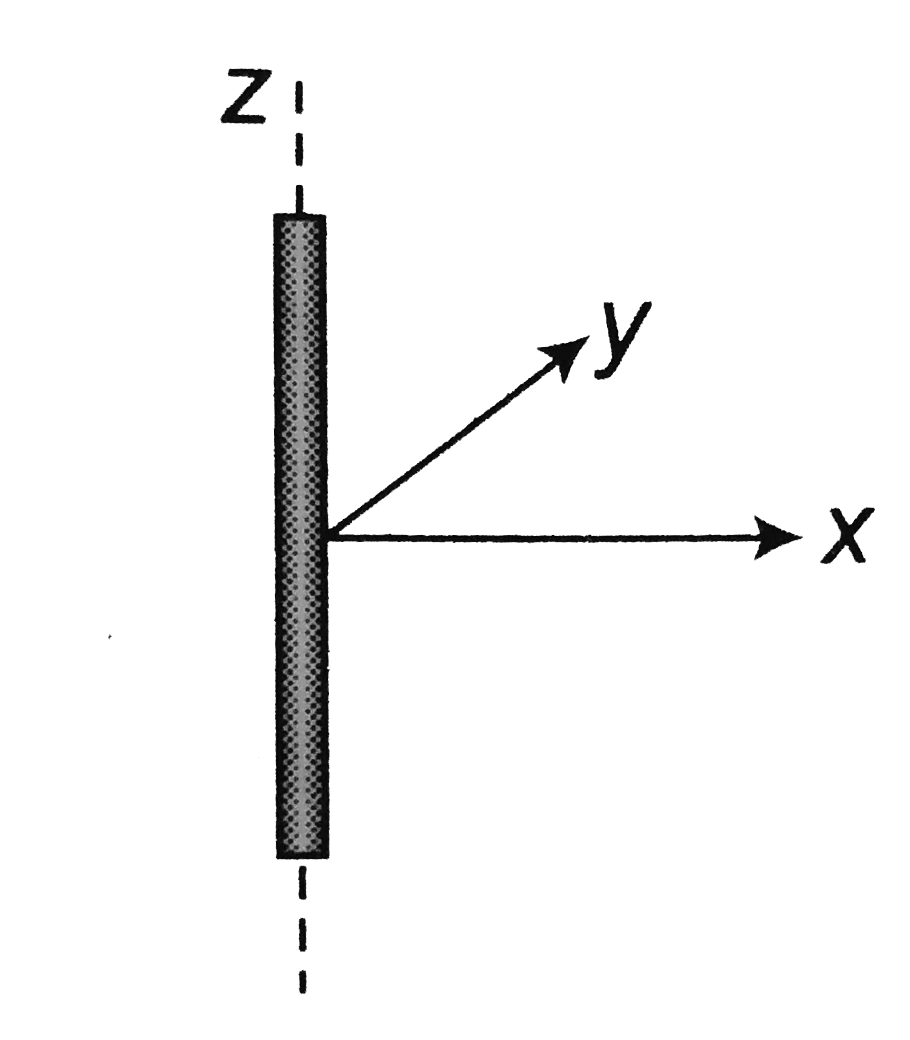
View SolutionA semicircular wire is uniformly charged with linear charge density dependent on the angle `theta` from `y`-direction as `lambda=lambda_(0) |sin theta|`, where `lambda_(0)` is a constant. The electric field intensity at the centre of the arc is
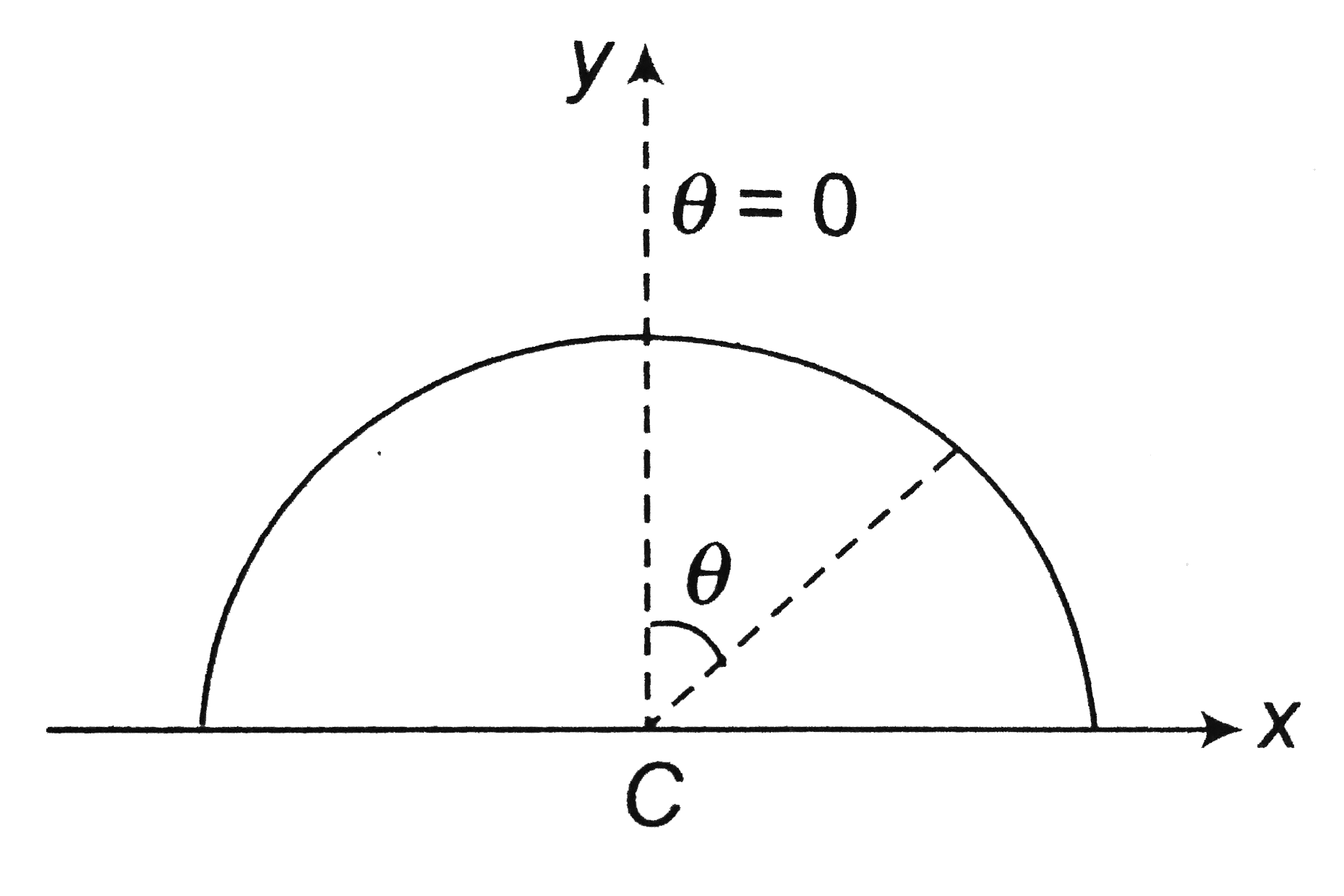
View SolutionA copper ball of density `8.6 gcm^(-3), 1 cm` is diameter is immersed in oil of density `0.8 dcm^(-3)`. If the ball remiand suspended in oil in a uniform electric field of intensity `36000NC^(-1)` acting in upward direction, what is the charge on the ball ?
View SolutionA charge `q` is placed at the some distance along the axis of a uniformly charged disc of surface charge density `sigma`. The flux due to the charge `q` through the disc is `phi`. The electric force on charge `q` exerted by the disc is
View SolutionSix charges are placed at the vertices of a rectangular hexagon as shown in the figure. The electric field on the line passing through point O and perpendicular to the plane of the figure as a function of distance x from point O is (xgtgta)
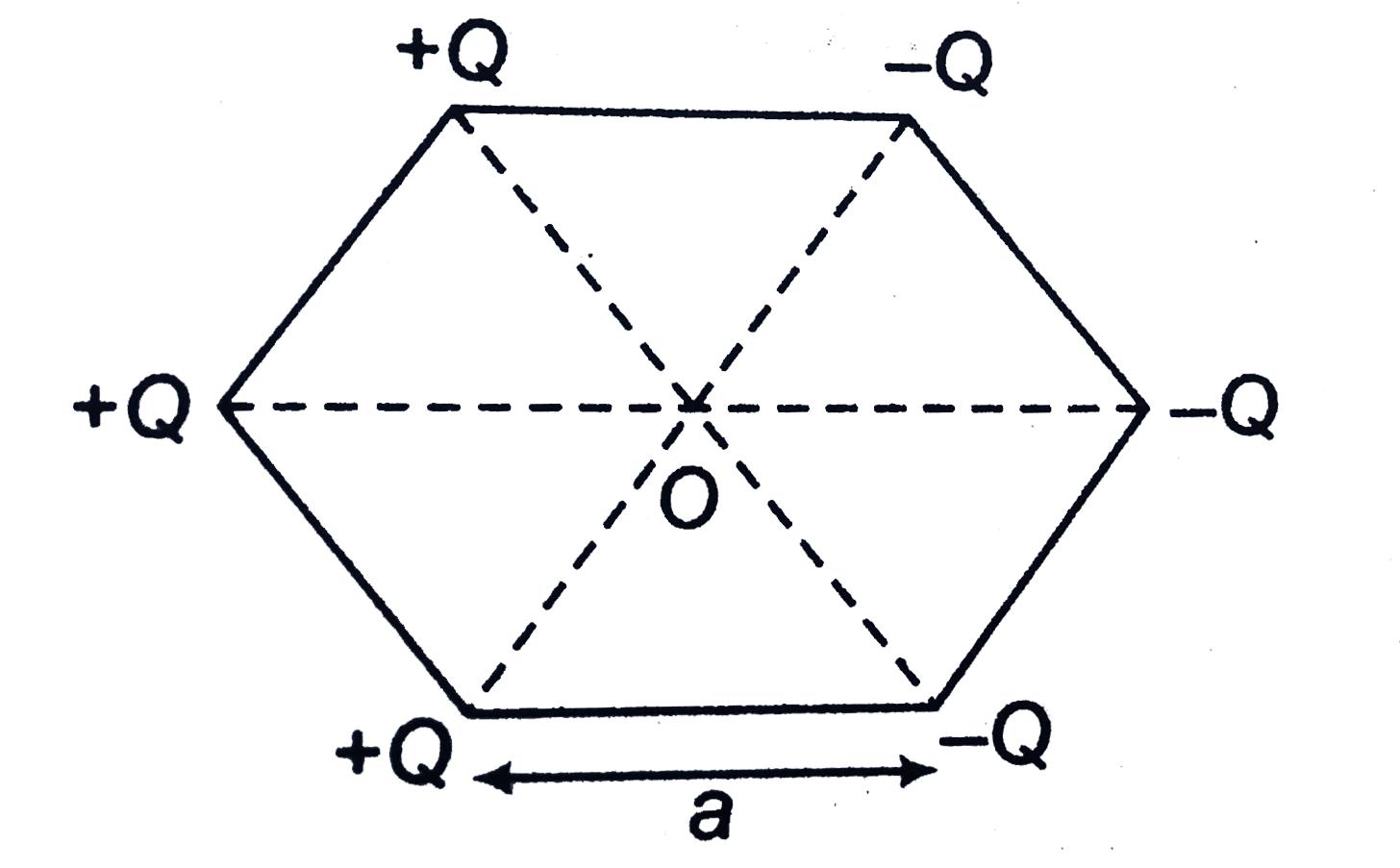
View SolutionA thin non-conducting ring of radius `R` has a linear charge density `lambda=lambda_(0) cos theta`, where `theta` is measured as shown. The total electric dipole moment of the charge distribution is
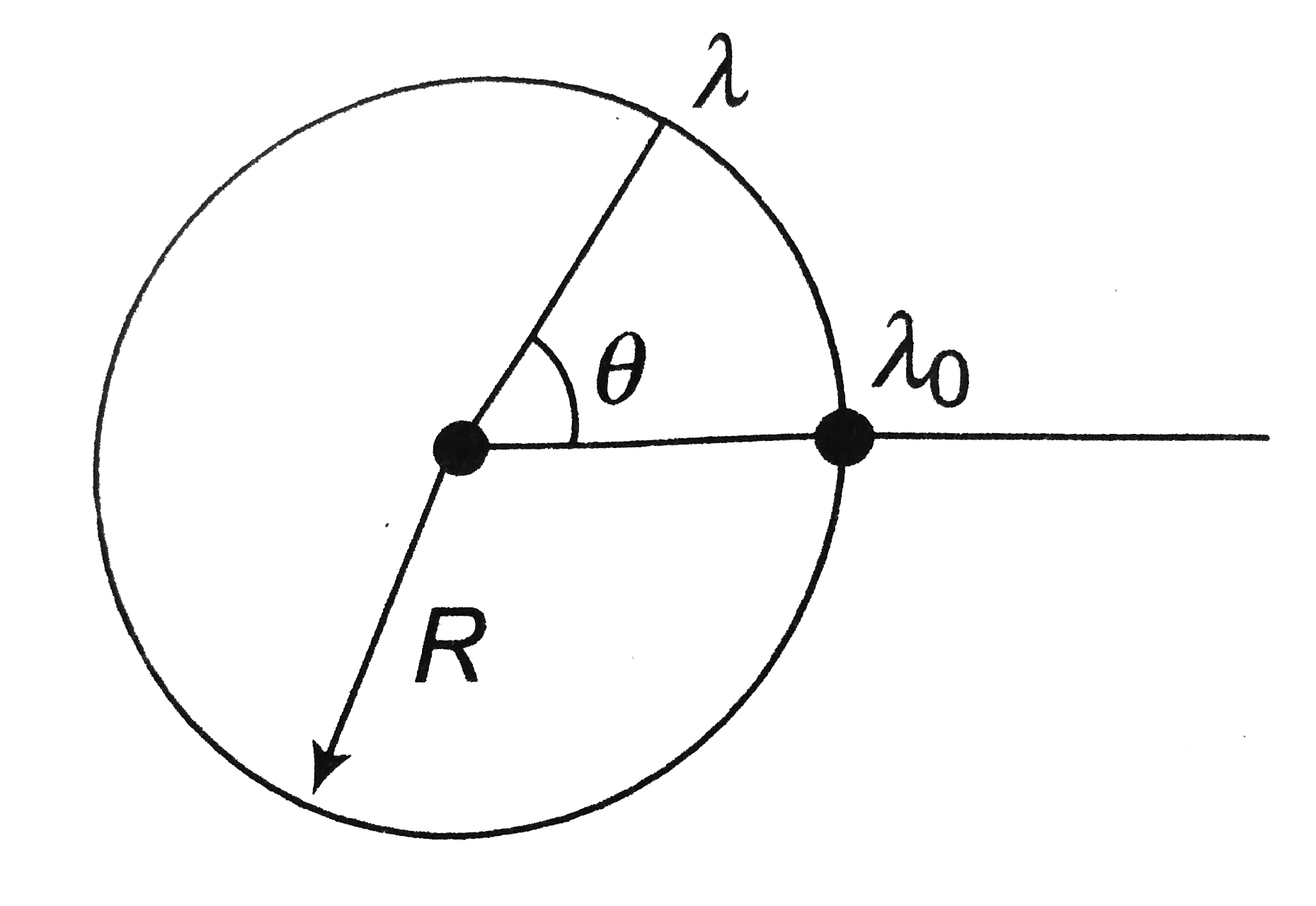
View SolutionAn uncharged conducting large plate is placed as shown. Now an electric field E towards right is applied. Find the induced charge density on the right surface of the plate.
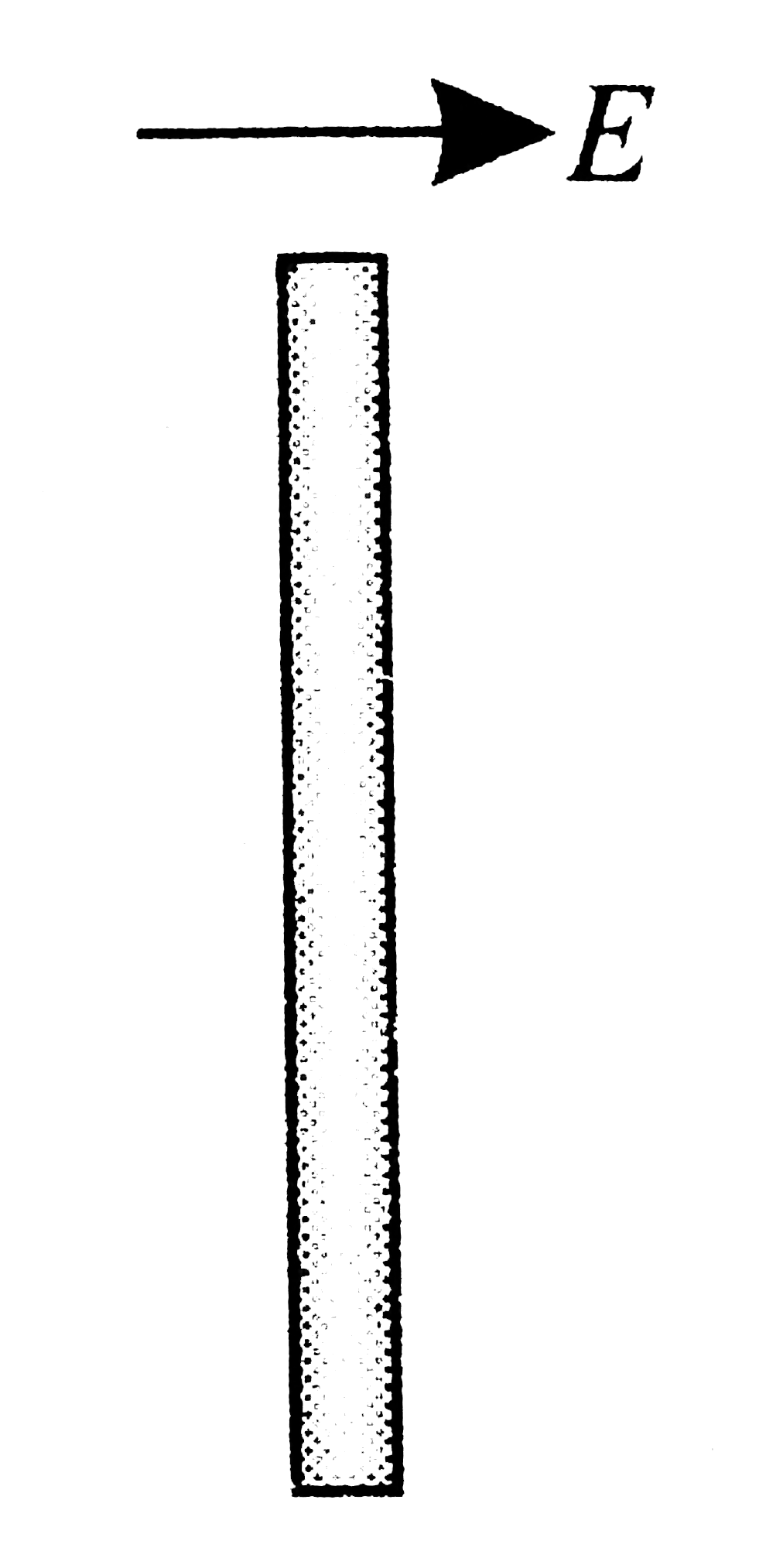
View SolutionAn uncharged aluminium block has a cavity within it. The block is placed in a region where a uniform electric field is directed upward. Which of the following is a correct statement describing conditions in the interior of the block's cavity?
View SolutionFigure shows a uniformly charged hemisphere of radius R. It has a volume charge density `rho`. If the electric field at a point 2R, above the its center is E, then what is the electric field at the point 2R below its center?
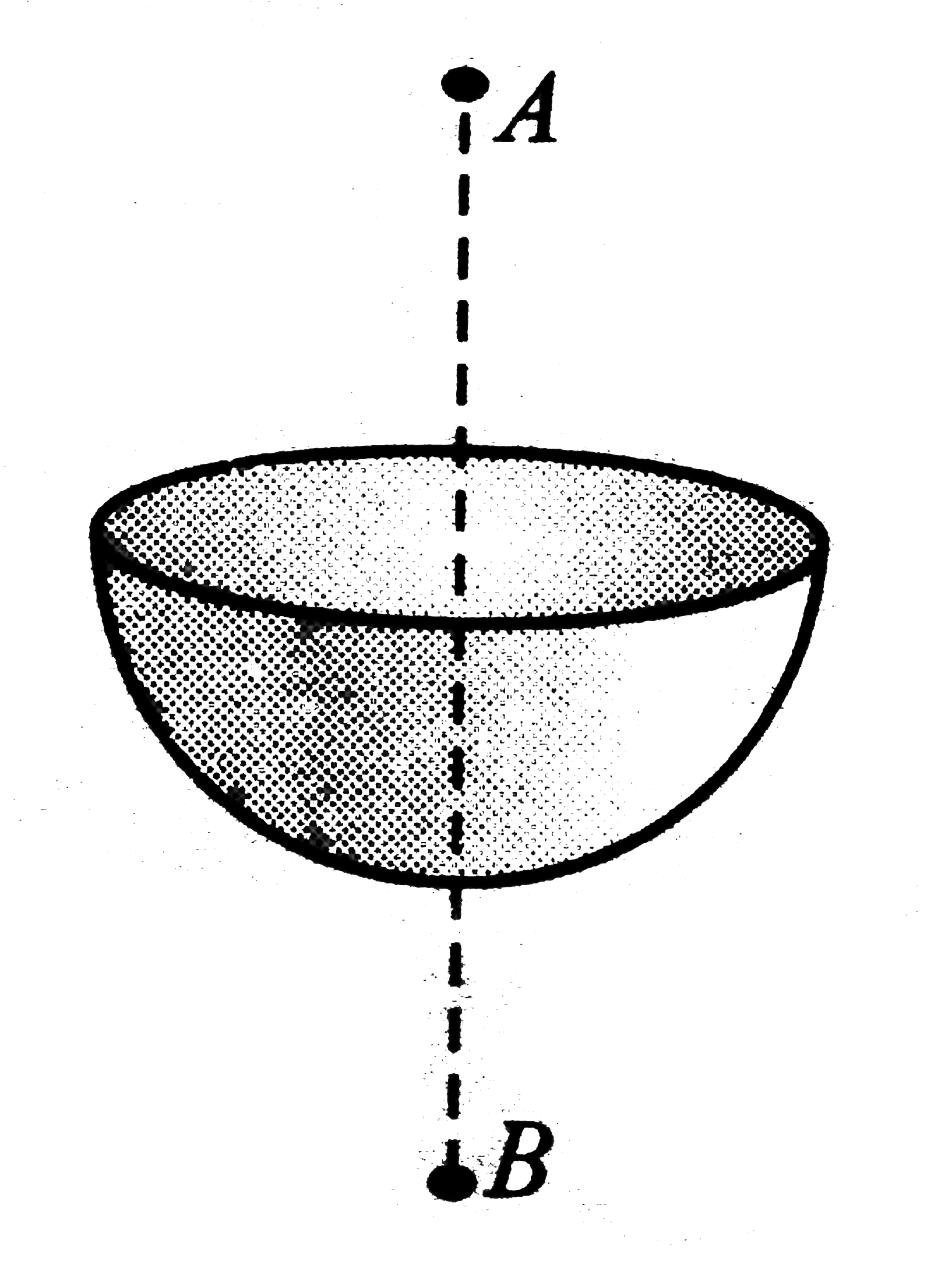
View SolutionConsider an infinite line charge having uniform linear charge density and passing through the axis of a cyclinder. What will be the effect on the flux passing through curved surface if the portions of the line charge outside the cyclinder is removed
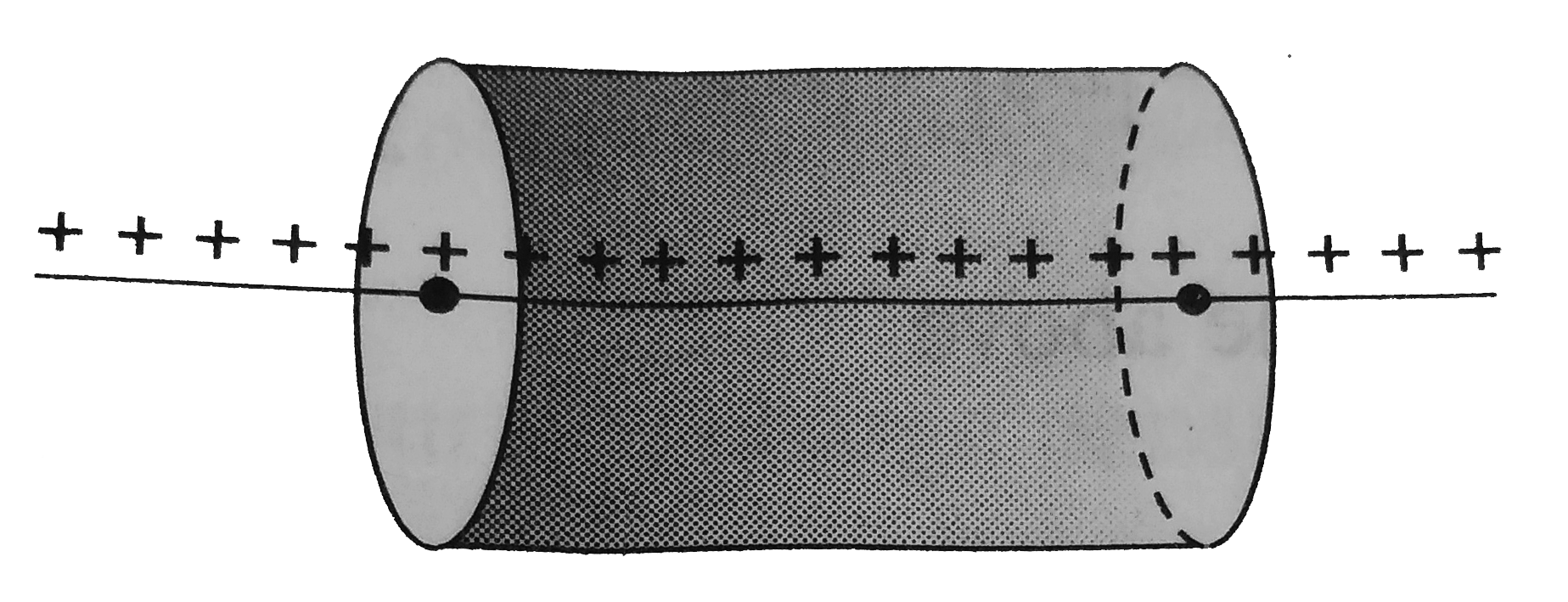
View SolutionA nonconducting sphere of radius R is filled with uniform volume charge density `-rho`. The center of this sphere is displaced from the origin by `vecd`. The electric field `vecE` at any point P having position vector inside the sphere is
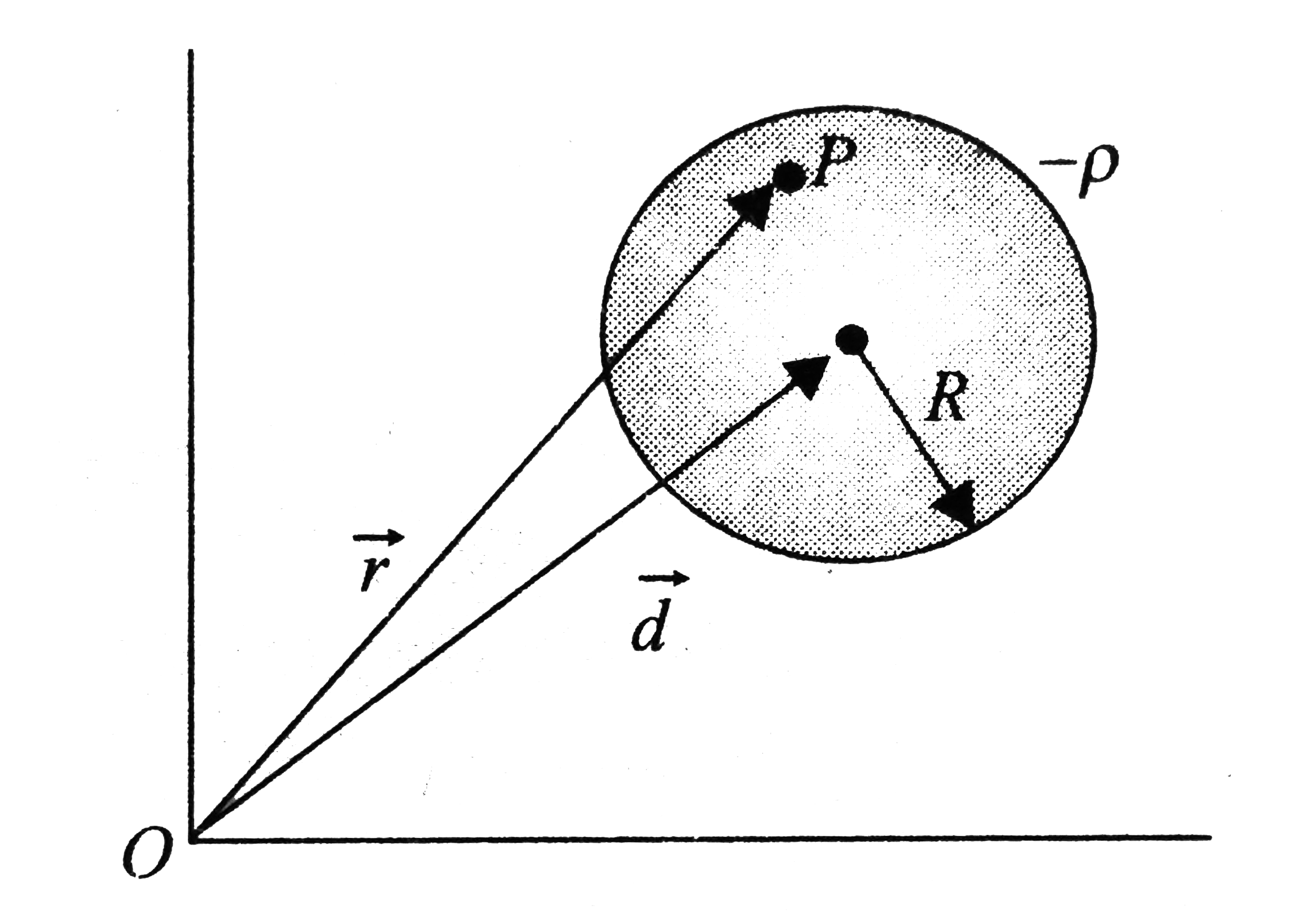
View SolutionA positively charge sphere of radius `r_0` carries a volume charge density `rho`. A spherical cavity of radius `r_0//2` is then scooped out and left empty. `C_1` is the center of the sphere and `C_2` that of the cavity. What is the direction and magnitude of the electric field at point B?
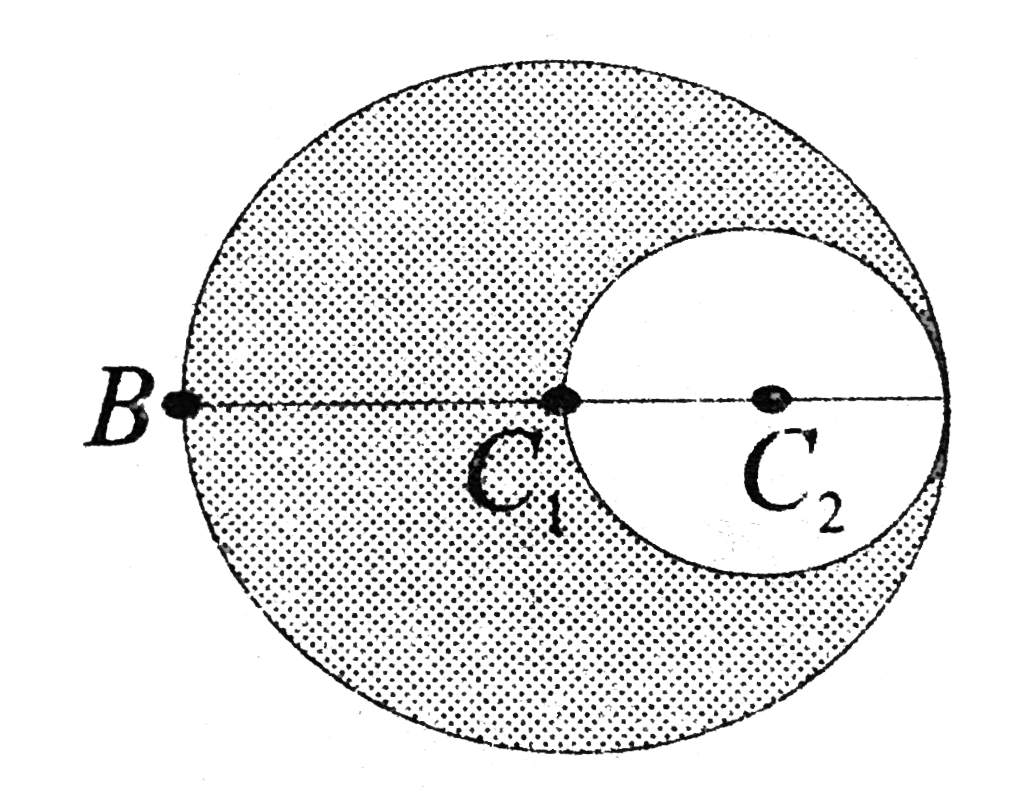
View SolutionFour very large metal plates are given charges as shown in figure. The middle two are then connected through a wire. Find the charge that will flow through the wire.
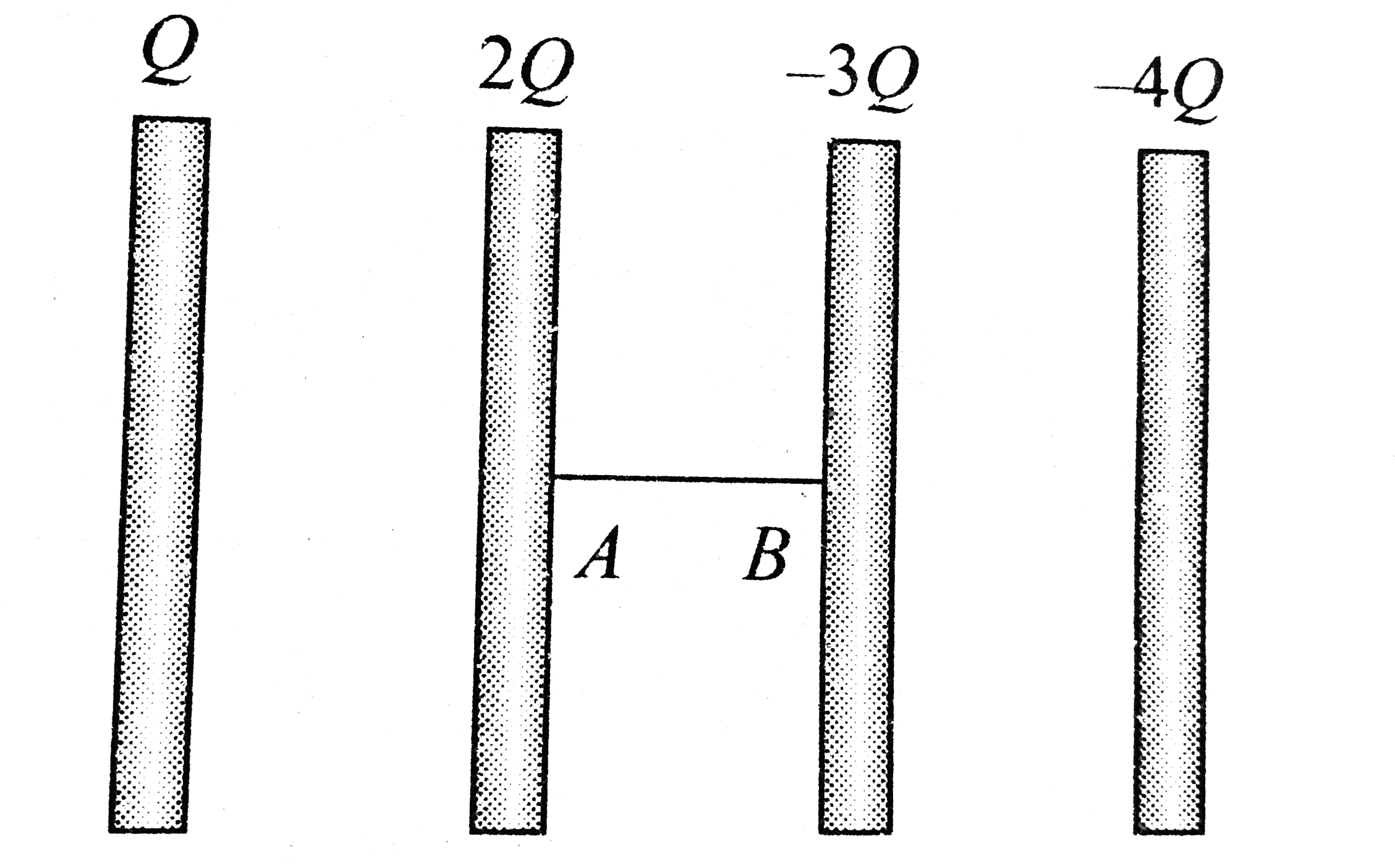
View SolutionA conic surface is placed in a uniform electric field E as shown in figure. Such that the field is perpendicular to the surface on the side AB. The base of the cone is of radius R, and the height of the cone is h. The angle of the cone is `theta`.
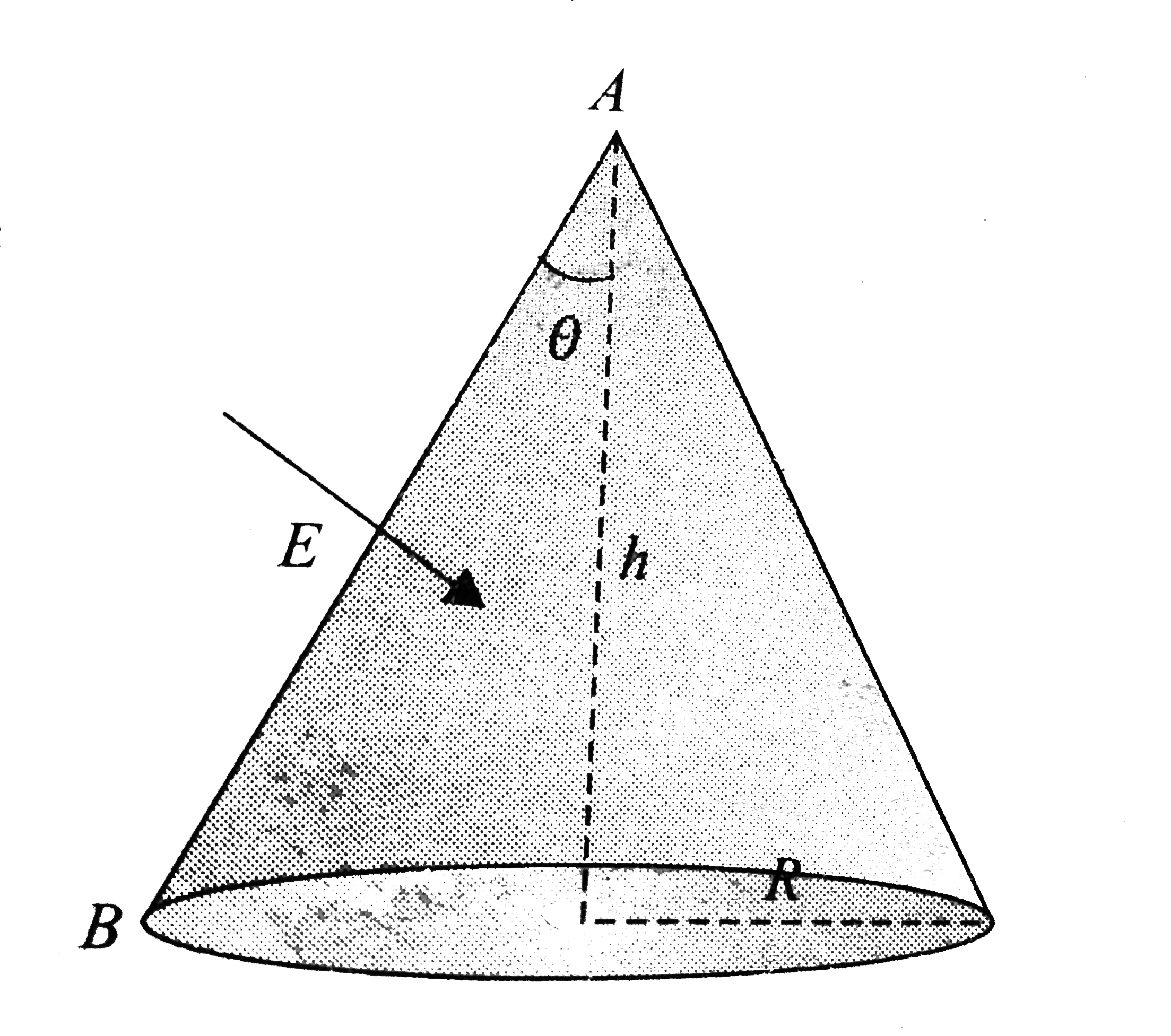
Find the magnitude of the flux that enters the cone's curved surface from the left side. Do not count the outgoing flux `(thetalt45^@)`.
View SolutionFlux passing through the shaded surface of a sphere when a point charge q is placed at the center is (radius of the sphere is R)
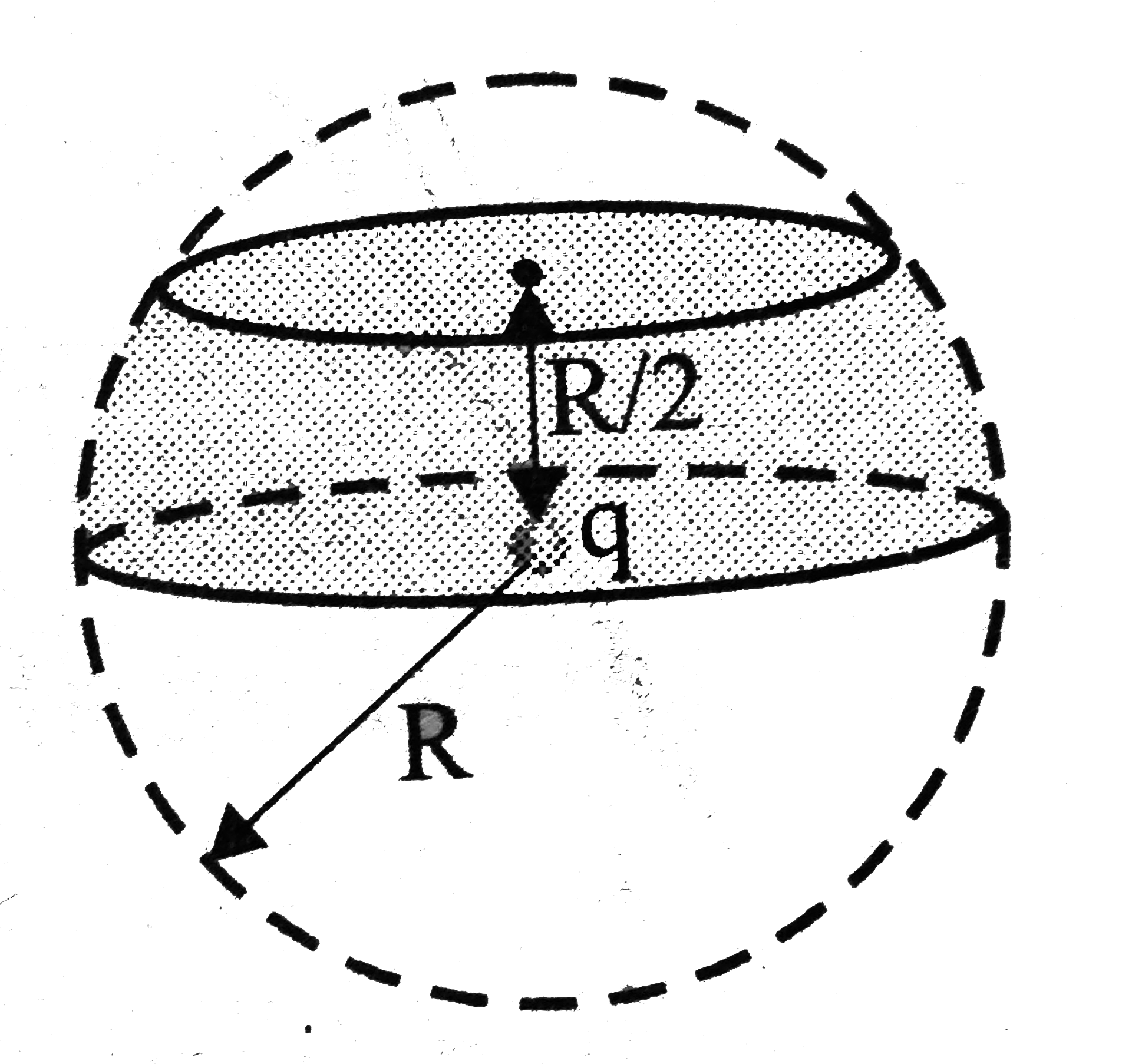
View SolutionA uniformly charged and infinitely long line having a linear charge density `'lambda'` is placed at a normal distance `y` from a point `O`. Consider a sphere of radius `R` with `O` as centre and `Rgty`. Electric flux through the surface of the sphere is
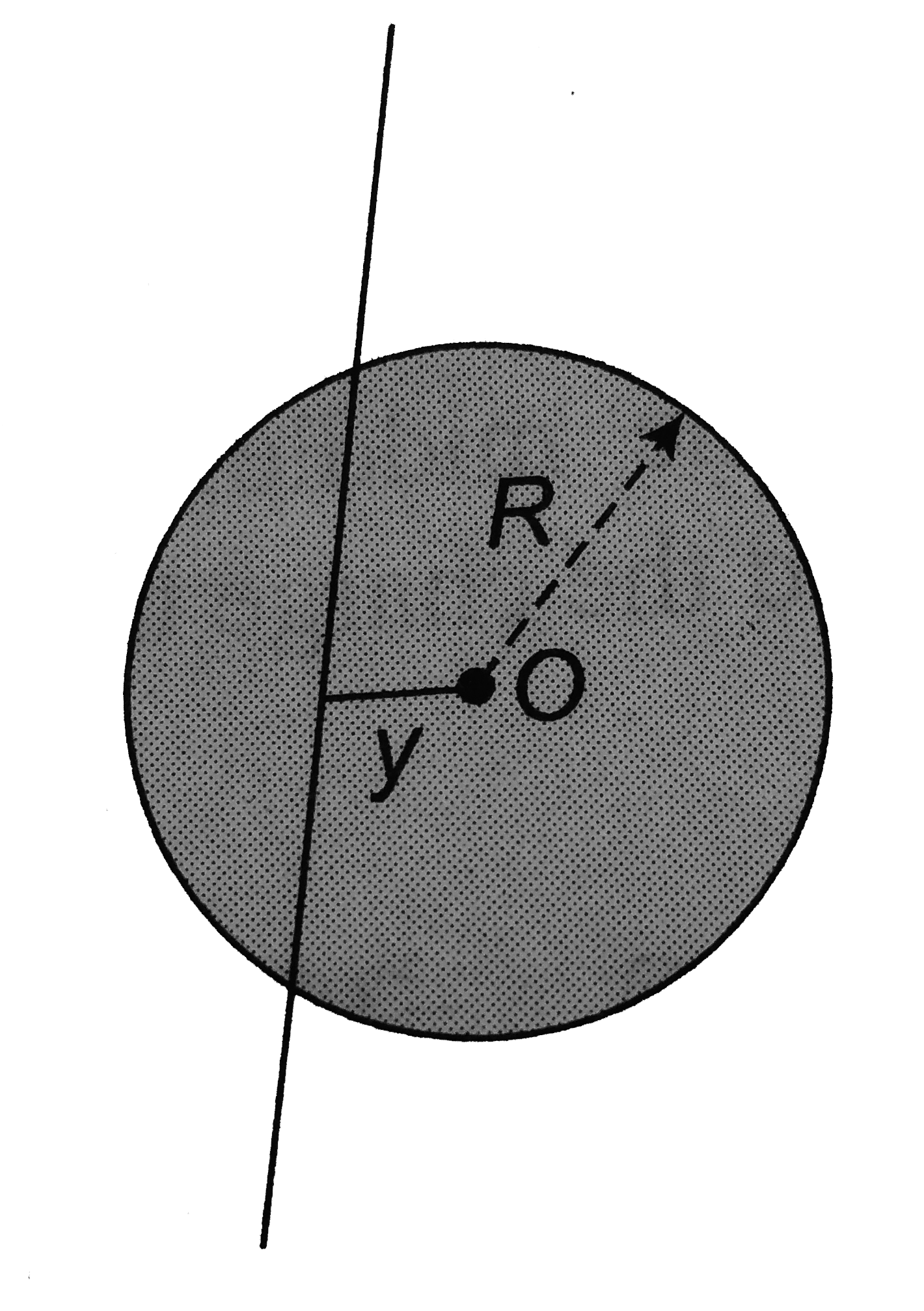
View SolutionTwo infinite sheets having charge densities `sigma_1` and `sigma_2` are placed in two perpendicular planes whose two-dimensional view is shown in figure. The charges are distributed uniformly on the sheets in electrostatic equilibrium condition. Four points are marked I, II, III and IV. The electric field intensities at these points are `vecE_1, vecE_2, vecE_3, and vecE_4`, respectively. The correct expression for the electric field intensities is
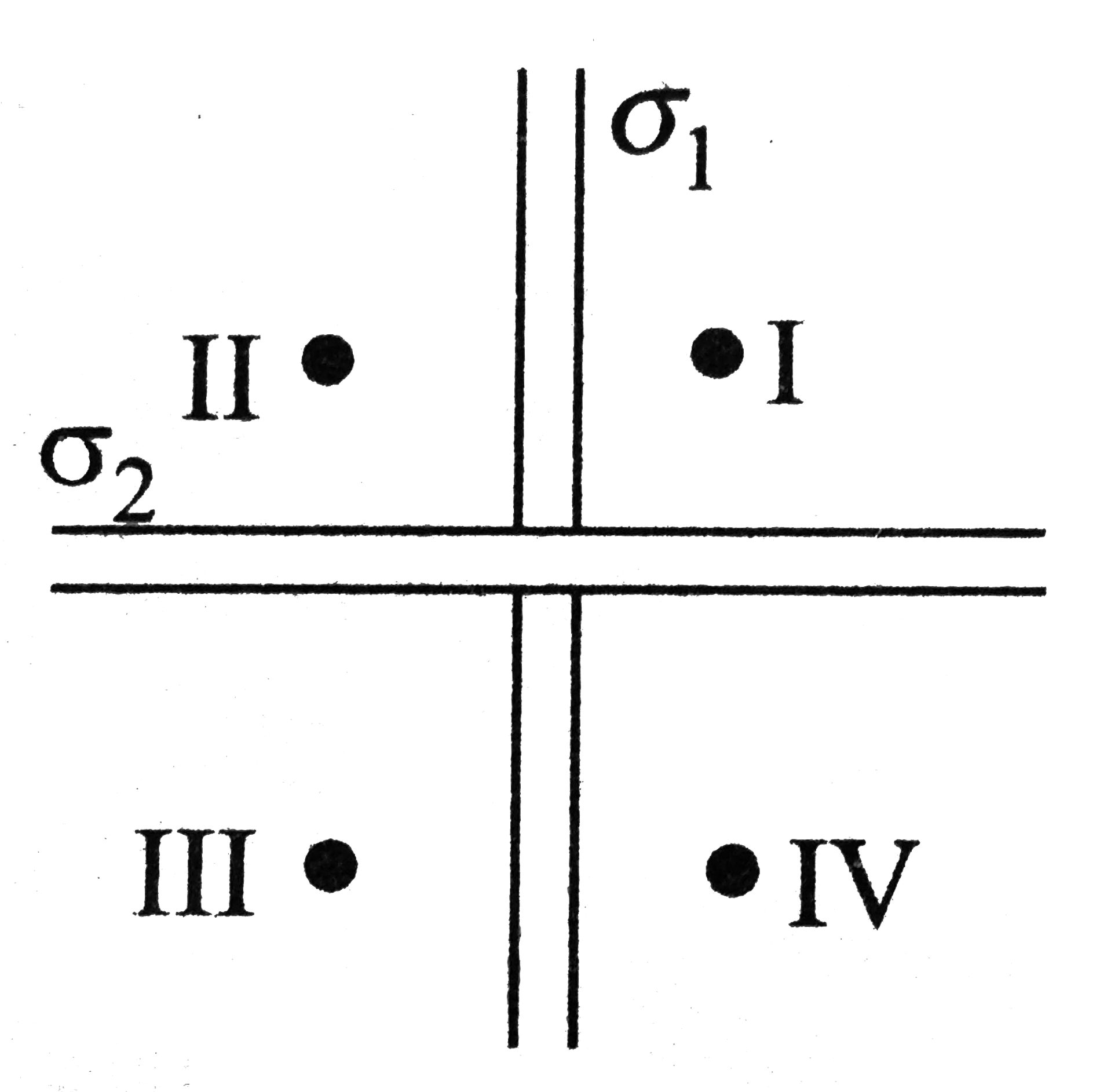
View Solution
Problems Based On Mixed Concepts questions and complete solutions for chapter ELECTRIC CHARGE, FIELD & FLUX of A2Z PHYSICS (HINGLISH) of Class 12